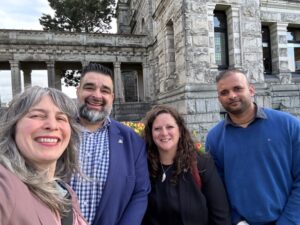Partner Spotlight Series Interview with Denise Moffatt
by Sumaiya Tufail – September 11, 2024
As part of the Understanding Precarity in BC (UP-BC) Project, I had the opportunity to interview Denise Moffatt, the Director of Government Relations and Political Action at the BC Federation of Labour (BCFED). Denise has been a pivotal member of the UP-BC Steering Committee from its inception. The British Columbia Federation of Labour represents over half a million workers across the BC economy, through more than 50 affiliated unions and over 800 locals.

How Denise Got Involved with BCFED
Denise’s journey with BCFED started long before her official role began. “I have been an advocate for workers for a number of years, dating back to my time as a teacher,” Denise shared. She served as the president of the Surrey Teachers Association and was also part of the BCTF executive. Her involvement with BCFED began about ten years ago, with her first task being the minimum wage campaign—the fight for $15. Reflecting on this period, Denise said, “It was exciting to work with labour and community organizations on a common goal to lift standards for all working people in BC.”
BCFED’s mission extends beyond its unionized members. “Our members are unionized workers, but BCFED works to improve the working conditions and rights of all workers in BC,” Denise emphasized.
Research on Gig Workers
One of the two sub-projects in UP-BC that got approved was research on gig workers, which Denise spearheaded along with Trish Garner, the Director of Policy and Strategic Initiatives, and Saemi Jung, a Research Assistant from Simon Fraser University. This comprehensive research included focus groups, interviews, and surveys targeting ride-hail and food delivery workers.
“We used the research in submissions and presentations to the Ministry of Labour and to the special committee reviewing passenger-directed vehicles,” Denise explained. The team also connected with ride-hail and food delivery advocates in other regions like Ontario and Washington. Through this research, they supported workers to participate in consultations and government processes, ensuring their voices and experiences were heard.
The impact of this research has been significant. “Because of the research and advocacy of BCFED, labour, community, and workers, the government has introduced employment standard laws and regulations as well as workers’ compensation coverage,” Denise noted. However, she pointed out that while these measures address some issues, many problems identified by ride-hail drivers remain unresolved.
Importance of Gig Work Research

When asked why this research is crucial for public understanding, Denise highlighted the surprising lack of rights and challenges these workers face daily. “People would be surprised to know how little rights these workers have and the types of challenges they face in their job on a day-to-day basis,” she said.
Denise also emphasized the rapid expansion of this work relationship into new areas, making it essential for British Columbians to understand the implications. “Without strong rules, many jobs may become more precarious,” she warned.
The research also sheds light on the demographics of gig workers, which is vital for addressing workplace law gaps. “There is an overrepresentation of racialized workers. Often, racialized workers with disabilities get caught in gaps in these laws,” Denise explained. The issue of worker misclassification has been a longstanding focus for BCFED, and this research is a continuation of that effort.
Future Hopes for the Research
Looking ahead, Denise expressed optimism that this research will create a clear picture of the experiences of ride-hail and food delivery workers. She hopes it will demonstrate that those most impacted by these working conditions already face systemic oppression and discrimination. “Governments have a responsibility to act and make sure people are not being left behind,” she asserted.
Denise is also hopeful that the research will push the government to be more proactive in addressing employment conditions and precarity. Additionally, she believes it will help the public understand that the convenience of services often comes with a cost. “We hope that the research will show the workers that people see them and value what they have to say about their work, and that they have a voice in how policies will impact them,” Denise concluded.
Through this insightful conversation with Denise Moffatt, it is clear that the work being done by BCFED and UP-BC is vital in advocating for the rights and improving the working conditions of gig workers in BC. The ongoing research and advocacy efforts are steps toward ensuring fair compensation and protections for all workers in this rapidly evolving sector.
